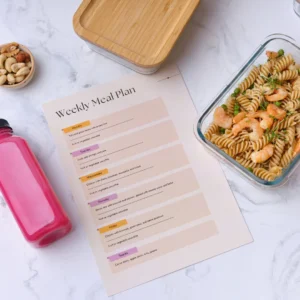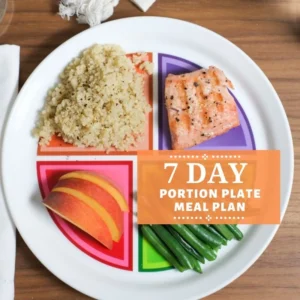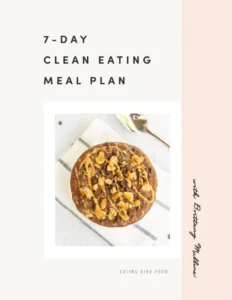Welcome to a week of 7-Day Balanced Meal Plan Are you ready to embark on a journey towards healthier eating habits? Look no further as we unveil a treasure trove of culinary delights designed to keep you feeling satisfied and energized. In this guide to 7-Day Healthy and Balanced Meal Plan Ideas, we’ll walk you through a week’s worth of mouthwatering recipes and smart meal choices. Say goodbye to the stress of meal planning and hello to a balanced lifestyle filled with nutritious delights. Get ready to indulge in flavors that not only tantalize your taste buds but also nourish your body from within.

Introduction:
Maintaining a healthy and balanced diet is crucial for overall well-being. A balanced meal plan provides the body with essential nutrients, and energy, and helps in maintaining a healthy weight. By following a 7-day healthy and balanced meal plan, you can ensure that you’re nourishing your body with the right foods while enjoying delicious meals.
What to Eat for a Healthy Balanced Diet:
A healthy and balanced diet consists of a variety of foods from all food groups, including fruits, vegetables, whole grains, lean proteins, and healthy fats. Here’s a breakdown of each food group:
Fruits: Opt for fresh, frozen, or canned fruits without added sugars. They are rich in vitamins, minerals, and fiber.
Vegetables: Incorporate a colorful array of vegetables into your meals. They provide essential nutrients and antioxidants.
Whole Grains: Choose whole grains such as brown rice, quinoa, oats, and whole wheat bread. They are high in fiber and provide sustained energy.
Lean Proteins: Include sources of lean protein such as poultry, fish, tofu, beans, lentils, and legumes. Protein is essential for muscle repair and growth.
Healthy Fats: Incorporate sources of healthy fats like avocados, nuts, seeds, and olive oil. They help in nutrient absorption and support heart health.

7-Day Sample Menu
Here’s a 7-day sample menu to help you kickstart your journey towards a healthier lifestyle:
Day 1:
Breakfast: Oatmeal topped with fresh berries and a sprinkle of almonds.
Snack: Greek yogurt with sliced cucumbers.
Lunch: Grilled chicken salad with mixed greens, cherry tomatoes, avocado, and balsamic vinaigrette.
Snack: Carrot sticks with hummus.
Dinner: Baked salmon with quinoa and roasted vegetables.
Snack: Apple slices with peanut butter.
Day 2:
Breakfast: Whole wheat toast with mashed avocado and a poached egg.
Snack: Mixed nuts and dried fruits.
Lunch: Turkey and vegetable wrap with whole grain tortilla.
Snack: Celery sticks with almond butter.
Dinner: Stir-fried tofu with broccoli, bell peppers, and brown rice.
Snack: Cottage cheese with pineapple chunks.
Day 3:
Breakfast: Smoothie made with spinach, banana, almond milk, and protein powder.
Snack: Whole grain crackers with sliced cheese.
Lunch: Quinoa salad with black beans, corn, cherry tomatoes, and cilantro lime dressing.
Snack: Edamame beans.
Dinner: Lean beef stir-fry with snow peas, carrots, and brown rice.
Snack: Berries with whipped cream.
Day 4:
Breakfast: Greek yogurt parfait with granola and mixed berries.
Snack: Hard-boiled eggs.
Lunch: Whole wheat pasta with marinara sauce, spinach, and grilled chicken.
Snack: Sliced bell peppers with guacamole.
Dinner: Grilled shrimp skewers with quinoa pilaf and steamed asparagus.
Snack: Trail mix with dried fruits and dark chocolate chips.
Day 5:
Breakfast: Whole grain pancakes topped with sliced bananas and honey.
Snack: Cottage cheese with cherry tomatoes.
Lunch: Lentil soup with a side of whole grain bread.
Snack: Apple slices with cinnamon.
Dinner: Baked cod with roasted sweet potatoes and green beans.
Snack: Rice cakes with almond butter.
Day 6:
Breakfast: Veggie omelet with spinach, tomatoes, and mushrooms.
Snack: Yogurt with granola.
Lunch: Quinoa-stuffed bell peppers with black beans, corn, and salsa.
Snack: Sliced cucumbers with hummus.
Dinner: Grilled chicken breast with quinoa tabbouleh salad.
Snack: Mixed berries with cottage cheese.
Day 7:
Breakfast: Whole wheat toast with mashed avocado and smoked salmon.
Snack: Mixed nuts and dried fruits.
Lunch: Turkey and avocado wrap with whole grain tortilla.
Snack: Carrot sticks with hummus.
Dinner: Baked tofu with roasted vegetables and brown rice.
Snack: Greek yogurt with honey and sliced almonds.
Learn How Many Calories You Burn Daily:
Understanding your daily calorie needs is essential for maintaining a healthy weight and achieving your fitness goals. Your calorie requirements depend on various factors such as age, gender, weight, height, and activity level.
About You:
To determine your daily calorie needs, you can use online calorie calculators or consult with a healthcare professional. These calculators take into account your basal metabolic rate (BMR) and activity level to estimate the number of calories you need to maintain your current weight.

Download the 1-Week Healthy and Balanced Meal Plan:
To make it easier for you to follow a healthy and balanced meal plan, you can download the 1-week meal plan provided above. This meal plan includes nutritious recipes and portion sizes to help you meet your daily calorie and nutrient requirements.
Conclusion:
A healthy and balanced meal plan is the foundation of a healthy lifestyle. By incorporating a variety of nutrient-dense foods into your diet and paying attention to portion sizes, you can nourish your body, maintain a healthy weight, and feel your best every day. Start small, make gradual changes, and remember that consistency is key to long-term success. With the 7-day sample menu and tips provided, you’re equipped to embark on a journey toward better health and well-being.
FAQS:
Q1:How do I make a 7-day meal plan?
Making a 7-day meal plan involves several steps:
Start by setting your health goals and dietary preferences.
Determine your daily calorie needs based on factors like age, gender, weight, height, and activity level.
Plan meals for each day of the week, including breakfast, lunch, dinner, and snacks.
Ensure your meal plan includes a variety of foods from all food groups to meet your nutritional needs.
Consider batch cooking and meal prepping to save time during the week.
Make adjustments to your meal plan as needed based on the availability of ingredients and changes in your schedule.
Q2:What is a balanced daily meal plan?
A balanced daily meal plan includes a variety of foods from all food groups in appropriate proportions to meet your nutritional needs. It typically consists of:
Fruits and vegetables: Rich sources of vitamins, minerals, and fiber.
Whole grains: Provides complex carbohydrates and fiber for sustained energy.
Lean proteins: Essential for muscle repair and growth.
Healthy fats: Supports heart health and helps in nutrient absorption.
Dairy or dairy alternatives: Good sources of calcium and other essential nutrients.
Water: Hydrates the body and supports overall health.
A balanced meal plan promotes overall well-being, supports healthy weight management, and reduces the risk of chronic diseases.
Q3:What is the 7-day challenge diet?
The 7-day challenge diet is a short-term diet plan designed to kickstart weight loss or jumpstart healthy eating habits. It typically involves following a strict meal plan for seven days, focusing on whole foods, portion control, and calorie restriction. The goal of the diet is to cleanse the body, reduce bloating, and promote rapid weight loss. However, it’s important to approach such diets with caution and consult with a healthcare professional before starting, as they may not be sustainable or suitable for everyone.
Q4:What 7 groups are needed for a balanced diet?
The seven groups needed for a balanced diet are:
Fruits: Rich in vitamins, minerals, and antioxidants.
Vegetables: Provides essential nutrients and fiber.
Whole grains: Good sources of complex carbohydrates and fiber.
Protein: Found in sources like poultry, fish, tofu, beans, lentils, and nuts.
Dairy or dairy alternatives: Supplies calcium and other vital nutrients.
Healthy fats: Derived from sources like avocados, nuts, seeds, and olive oil.
Water: Essential for hydration and overall health.
Including a variety of foods from these groups in your daily diet ensures that you’re getting all the nutrients your body needs to function optimally.


